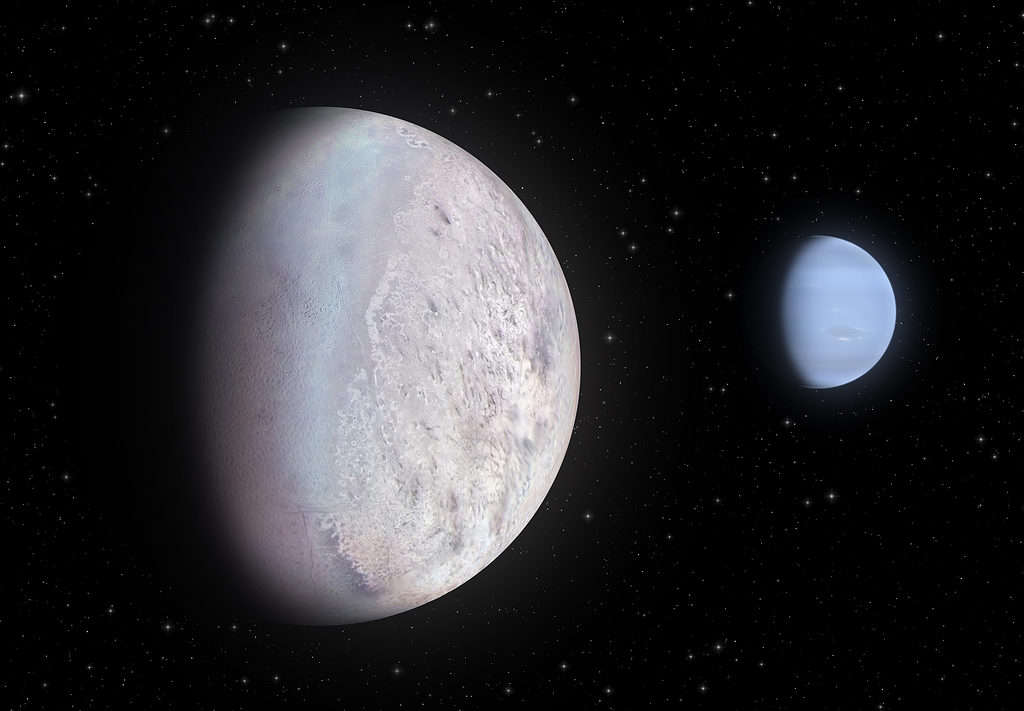Neptune is the farthest planet away from the sun in the solar system. No, Pluto is still not considered a planet because it has not cleared its orbit. Neptune is roughly 2.8 billion miles away from the sun, almost 30 times the distance between Earth and the sun. The process of naming the planetary outlier was arduous, and the planet almost ended up with a different name. So, how did Neptune get its name? Discover the origin and meaning of the planet’s name.
How Did Planet Neptune Get Its Name?

The planet was named for a Roman deity of the sea.
©NASA images/Shutterstock.com
Neptune was named after the Roman god of the sea by Urbain Le Verrier, the man that predicted the location of the planet using mathematical calculations. At least, that’s the simple explanation. We’ll get back to that in a moment. In Roman mythology, Neptune was the god of the seas and other waters along with horses and horsemanship.
The name may have stemmed from the fact that the planet Neptune appears to be royal blue and other shades of blue. The color comes from the methane clouds in the atmosphere mixing with clouds on the planet. So, if someone were just seeing the planet for the first time, then they may see a beautiful sea.
Since Neptune was the god of the sea, the name made sense. Also, this name would help bring the planet-naming system back to Roman deity names following the discovery and naming of Uranus. After all, Uranus is the only planet, except Earth, not named after a Roman deity. The name is a Latinized version of the Greek name, Ouranos.
On the surface, that’s the reason why the planet was named the way it was. However, the story of how it was named is longer and took a fair amount of compromise. To understand how Neptune became known as such, it’s necessary to know the story of its discovery.
When Was Neptune Discovered and Who Discovered It?

Neptune could not be discovered without the aid of a telescope, so it was the last true planet found in the solar system.
©Allexxandar/Shutterstock.com
The simplest way to look at the discovery of Neptune was that it was first visually confirmed on September 23, 1846, by Johann Galle. However, it’s not as simple as saying the people who aimed the telescope at the planet deserve the credit in this case.
Neptune and Uranus are the only planets that are not viewable with the naked eye. So, the invention of the telescope and its use by people like Galileo was a large step forward in exploring the night sky and finding new celestial bodies.
William Herschel discovered Uranus in 1781. Decades later, Bouvard theorized that the planet was being influenced by another exterior planet. That made astronomers begin to look for the planet that would become Neptune.
Starting in 1843, John Couch Adams, a British astronomer, started plotting the orbit of Uranus. In 1846, he theorized that the planet’s irregularities of motion were being caused by another distant planet. Meanwhile, Urbain Le Verrier, a French astronomer, began working on mathematical calculations to predict the position of Neptune based on the celestial mechanics of Uranus.
Le Verrier presented his findings to the French Academy on August 31, 1846, and Adams presented his finalized work days later to the Royal Greenwich Observatory. Le Verrier sent his prediction of the planet’s location to the Berlin Observatory. Two astronomers, Johann Galle and Heinrich d’Arrest, visually confirmed the existence of the planet the same night it arrived on September 23.
What Was Neptune Originally Called?

An image of Neptune and Triton.
©Diego Barucco/Shutterstock.com
Originally, Neptune was left unnamed, and it was called by a few different titles. They were “Le Verrier’s planet” or descriptively, “the planet exterior to Uranus.” However, there was some controversy over the naming rights of the planet.
The problem of crediting the discovery of the planet and naming rights soon emerged. Adams started his work long before Le Verrier. Le Verrier accurately predicted the planet’s location and his work was finished first.
Galle found it first after receiving a letter from Le Verrier, but only with the help of Le Verrier’s predictions. So, who gets to name the planet? Galle may have had a better claim than Adams, but certainly not better than Le Verrier, right?
Although Le Verrier had predicted the planet, Johann Galle was the first to see the planet. As a result, Galle wanted to name the planet Janus, the name of another Roman deity with two faces. This name would symbolize the fact that the planet would face both the interior of the solar system and the unknown realms outside of it.
However, Le Verrier was not going to give up the naming rights to the planet he found that easily. On September 28, Le Verrier received Galle’s letter telling him of the planet’s discovery and the name he proposed.
Yet, he could not present the name to his fellow scholars since their weekly meeting had passed. So, Le Verrier went to the newspapers with his story and said the planet would be called Neptune. He successfully preempted the English astronomers from naming the planet.
The Planet Naming Fiasco Continues
The naming was not well-received outside of France after the story broke. Le Verrier sent letters out on October 1, 1846 to thank the other scientists and inform them of his name choice.
Yet, the matter was not finished in the eyes of many, though. Sir George Airy, a man Le Verrier respected, put forth the name Oceanus. Following that, Le Verrier backtracked on the name Neptune and may have even denied coming up with the name at all!
At one point, the French almanac referred to the planet as Le Verrier since the astronomer suddenly wanted to name the planet after himself. This name was not well-received, and neither was the notion that Uranus should be called Herschel. Letters flew from one scientist to another until 1847 when the planet’s name was solidified.
So, how did Neptune get its name? There’s a long answer and a short answer. The long answer shows the competitive nature of astronomy, a hint of arrogance, and even more confusion over who gets to name a celestial body. Still, it’s amazing that preserved documents show the effort that went into naming this cold, desolate planet over a century ago!
The photo featured at the top of this post is © iStock.com/3quarks
Thank you for reading! Have some feedback for us? Contact the AZ Animals editorial team.






